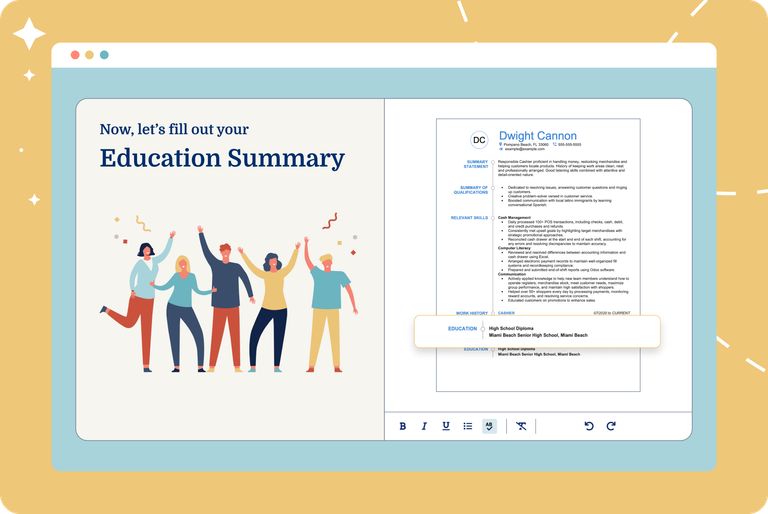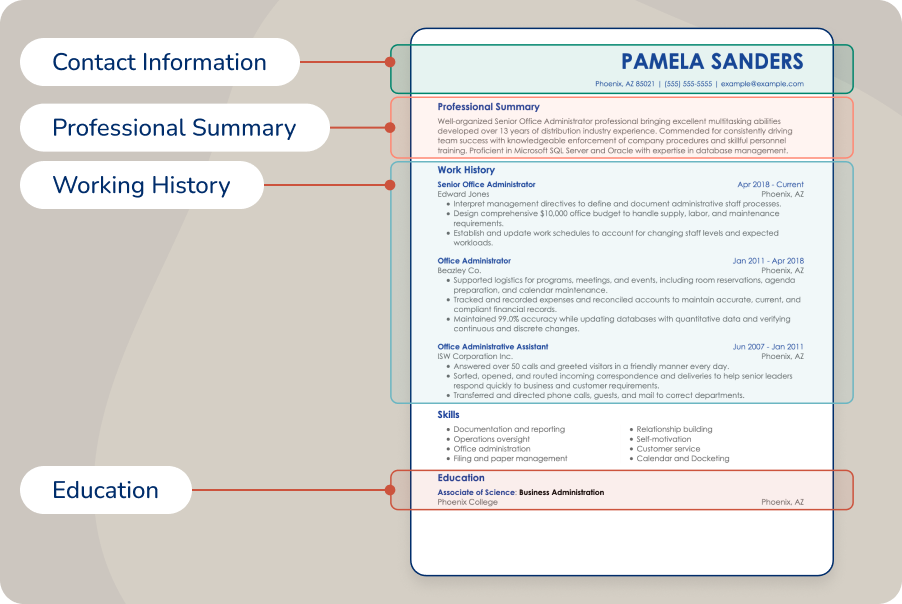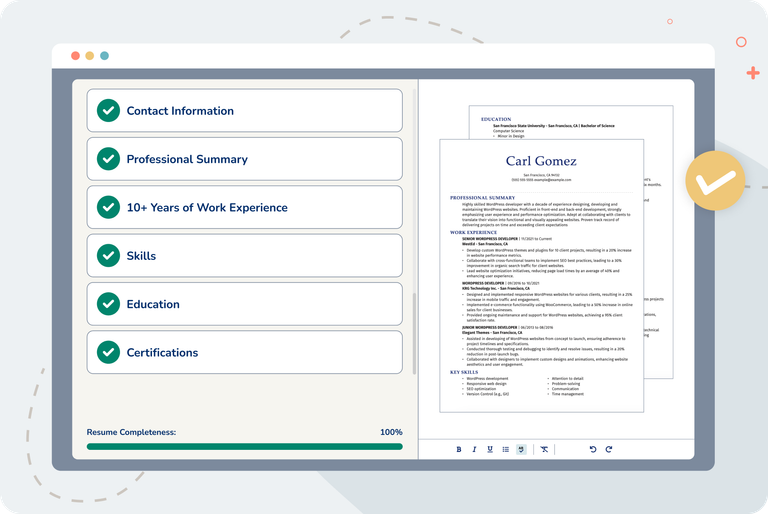Management Skills: Examples & Tips for Your Resume

Our customers have been hired at: *Foot Note
AI Resume Skills Generator

Management work is fundamental to organizational success, involving diverse responsibilities crucial to efficient operations and strategic growth. Managers are pivotal in overseeing teams and resources, ensuring productivity and fostering a collaborative work environment. They undertake essential duties such as strategic planning, resource allocation, performance evaluation, and fostering effective communication across departments to achieve organizational goals.
You’ll need the right management skills and an impressive resume to beat the competition and land your dream job in management. Read our comprehensive guide on how to write a resume for tips.
More management resume examples
- Manager Resume Examples and Templates
- Business Management Resume Examples & Templates
- Warehouse Manager CV Guide + Tips + Example
- Retail Management Professional Resume Example
- Hotel Management Trainee Resume Examples & Guide
Management skills examples for your resume
Showcase a mix top management skills in your resume to emphasize your leadership capabilities and increase your chances of securing the job you want. Adding a mix of professional skills demonstrates your ability to navigate complex environments, lead teams effectively, and drive organizational success.
Here are some key management skills to emphasize on your resume.
Hard skills are specific, measurable competencies gained through education, training and practical experience in management.
Examples of hard management skills include:
- Financial analysis
- Project management
- Data analysis
- Strategic planning
- Budget management
See also: Project Management Skills: Examples for your Resume
Soft skills are personal attributes that facilitate effective interactions and teamwork within management roles, essential for fostering a positive work environment and achieving organizational objectives.
Examples of soft management skills include:
- Communication
- Leadership
- Problem-solving
- Decision-making
- Critical thinking
See also:
Computer skills are vital for managers in today's digital age. They enable the efficient use of various software and tools for data management and project coordination.
Examples of computer skills for managers include:
- Proficiency with MS Office Suite
- Data visualization tools
- Project management software
- Database management
- Basic IT troubleshooting
Technical skills encompass the specific knowledge and expertise required to effectively manage operations and utilize technological resources.
Technical skills for managers include:
- Operations management
- Quality control
- Risk assessment
- Logistics management
- Supply chain management
Interpersonal skills are critical in management for fostering productive relationships, effective communication, and collaborative decision-making.
Examples of interpersonal management skills include:
- Negotiation
- Communication
- Coaching and mentoring
- Networking
- Emotional intelligence
See also: Conflict Resolution Skills for Your Resume and Workplace
Transferable skills are versatile competencies applicable across various industries and roles, enhancing adaptability and career opportunities in management and beyond.
Examples of transferable management skills include:
- Time management
- Strategic thinking
- Adaptability
- Analytics
- Organizational skills
See also:
We recommend exploring our library of resume examples for ideas on highlighting management skills effectively on your resume.
How to improve your management skills
Continuously developing your management skills is key to your success, the success of the teams you lead and ultimately to the success of the organization you work for.
Here are 10 training tips specifically tailored to enhance management skills:
- Participate in interactive workshops focused on specific management skills such as communication, delegation, or conflict resolution. These workshops often provide hands-on exercises and simulations to practice skills in a safe environment.
- Practice your management skills by engaging in role-playing exercises with colleagues and mentors
- Analyze real-world case studies of successful and challenging management scenarios for insights into effective management strategies and tactics.
- Pair up with a peer or colleague for mutual support, guidance and encouragement.
- Enroll in leadership development programs offered by professional organizations, such as business schools, and online platforms such as LinkedIn Learning, Emeritus and Paycor.
- Don’t be afraid of feedback. As your supervisors, direct reports, stakeholders, and mentors about your management strengths and weaknesses, and create a professional development plan to improve your management skills.
- To learn management techniques and stay current with best practices, read professional journals, blogs, books, and articles, listen to podcasts, and attend management seminars and conferences.
- Build relationships with other managers and professionals in your field through networking events, professional associations, and online communities. Exchange ideas, share experiences, and learn from others' successes and challenges.
- Be self-aware: Reflect on your leadership successes and failures. Note lessons learned and which management skills you can improve.
- Establish specific, measurable, achievable, relevant and time-bound (SMART) goals for your management skills development. Break down large goals into smaller milestones and track your progress over time.How to highlight management skills on your resume
How to highlight management skills on your resume
Management skills demonstrate your ability to lead teams, drive organizational success, and navigate complex business environments effectively. Emphasizing these skills on your resume showcases your leadership, strategic thinking, and operational expertise, qualities highly valued across industries.
Review our tips below to help you effectively describe your management skills throughout your resume:
Highlight management skills in your resume summary or objective
Incorporate your management skills into your resume summary to immediately capture employers’ attention.
Here's an example of a strong resume summary emphasizing management skills:
We recommend new managers consider using a resume objective centered on career goals and transferable management skills.
Here's an example of a great resume objective for a new manager:
Emphasize your skills in a separate section
Create a dedicated section for your management skills, organizing them into categories such as "Leadership Skills," "Strategic Skills," and "Technical Skills." Use bullet points for clarity and to ensure compatibility with applicant tracking systems (ATS). Aim to list up to 12 relevant skills.
For example:
Leadership Skills
- Team building
- Conflict resolution
- Decision-making
Strategic Skills
- Strategic planning
- Business development
- Market analysis
Technical Skills
- Project management software (e.g., MS Project)
- Data analysis tools (e.g., Excel)
- CRM systems (e.g., Salesforce)
Display your quantifiable achievements
Highlight your management skills in your work history through measurable accomplishments rather than just listing responsibilities in your work history section. Alternatively, create a separate section to showcase your top achievements.
Here are some examples of quantifiable achievements that demonstrate management skills:
- Achieved a 20% increase in team productivity by implementing streamlined processes and effective performance management strategies.
- Successfully launched a new product line that generated $1 million in revenue within the first year, surpassing sales targets by 30%.
- Led a cost-saving initiative that reduced operational expenses by 15% through renegotiating vendor contracts and implementing lean practices.
- Improved customer satisfaction scores by 25% through the implementation of a customer service training program and personalized service strategies.
- Enhanced team engagement and retention by introducing mentorship programs, resulting in a 40% decrease in turnover rates.
- By effectively showcasing your management skills and achievements, you can demonstrate your capability to drive success and contribute to organizational growth effectively.
Use action words to describe your nursing skills
Action wordslike "lead," "implement," and "optimize" emphasize the impact of your managerial contributions. Utilize them to highlight your management skills effectively.
For instance, stating that you "Led a cross-functional team in implementing a new project management system, reducing project timelines by 20% and increasing team efficiency" demonstrates your leadership and strategic abilities.
Here are some impactful action words to describe your management skills:
- Lead
- Implement
- Optimize
- Strategize
- Delegate
- Analyze
- Innovate
- Streamline
- Collaborate
- Mentor
Common tools and technologies used in management
Managers rely on various modern tools and technologies to optimize operations, enhance productivity, and achieve organizational goals. Below is a list of some common tools and technologies essential for effective management:
- Project management software facilitates planning, scheduling, and collaboration across teams for efficient project execution.
- Customer relationship management (CRM) systems manage customer interactions and data throughout the customer lifecycle to improve relationships and sales growth.
- Data analytics tools enable managers to analyze large datasets, derive insights, and make data-driven decisions for strategic planning.
- Enterprise resource planning (ERP) systems integrate core business processes such as finance, HR, and supply chain management to streamline operations.
- Collaboration platforms: facilitate communication, document sharing, and teamwork among dispersed teams, enhancing productivity and innovation.
- Performance management software: tracks employee performance metrics, sets goals, and provides feedback to optimize workforce productivity and development.
- Business intelligence (BI) tools: provide insights into business operations and trends through data visualization and reporting, aiding in decision-making.
- Virtual meeting and conferencing tools: enable remote communication, virtual meetings, and webinars to facilitate global collaboration and reduce travel costs.
- Workflow automation software: automates routine tasks and processes, improving efficiency, reducing errors, and freeing up time for strategic initiatives.
- Cloud computing services provide scalable and secure storage, computing power, and applications accessible from anywhere, supporting flexible business operations and continuity.
Best management certifications
- Project Management Professional (PMP)
- Certified ScrumMaster (CSM)
- Certified Manager (CM)
- Certified Management Consultant (CMC)
- Six Sigma Certification
Key takeaways
- Management is crucial for organizational success, encompassing responsibilities like strategic planning, team oversight, and fostering collaboration to achieve goals effectively.
- Highlighting management skills on your resume is essential to stand out in a competitive job market. These skills include leadership, strategic thinking, and effective communication.
- Pursuing certifications such as PMP, CSM, CM, CMC, and Six Sigma can enhance career prospects by validating skills and demonstrating expertise in specific management areas.
- Managers utilize various tools and technologies like project management software, CRM systems, and data analytics tools to optimize operations and drive productivity.
- Continuously developing management skills through training programs, workshops, and networking is crucial for career growth and staying current with industry trends.
- Emphasize management skills throughout your resume, use action words to highlight achievements, and consider quantifying accomplishments to showcase your impact and capabilities.
- Utilize tools like resume builders to create a professional resume efficiently, emphasizing your management skills and certifications effectively.
FAQ
What are management skills, and why are they important?
Management skills encompass a range of abilities that enable individuals to effectively lead teams, delegate tasks, make decisions, and achieve organizational goals. They are essential for driving productivity, fostering teamwork, and ensuring the success of projects and initiatives.
Which management skills should I highlight on my resume and cover letter?
When crafting your resume and cover letter, highlight management skills such as leadership, communication, strategic planning, problem-solving, delegation and decision-making.Tailor your resume examples to showcase how you’ve applied these skills in previous roles to achieve results.
How can I demonstrate my leadership skills on my resume?
Include specific examples of leadership experiences and professional accomplishments in your resume, such as leading teams, implementing new initiatives, or mentoring junior staff. Use quantifiable metrics whenever possible to showcase the impact of your leadership.
How do I showcase my communication skills in my cover letter?
Use your cover letter to demonstrate your communication skills by clearly articulating your qualifications, experiences, and motivations for the role. Focus on concise and persuasive writing, avoiding jargon or overly complex language.
What is the best way to highlight problem-solving skills on my resume?
On your resume, showcase your problem-solving skills by describing challenging situations you’ve faced in previous roles, the steps you took to analyze the problem, and the solutions you implemented. Emphasize your ability to think critically and adapt to changing circumstances.
How can I incorporate management skills into my resume's summary or objective statement?
Start your resume with a strongresume summary or objective statement highlighting your management skills and achievements. Use keywords from the job description to tailor your statement to the specific role you’re applying for, emphasizing your qualifications and potential contributions.
Can I include examples of management skills in my work experience section?
Absolutely! Use your work experience section to provide concrete examples of how you’ve utilized management skills in previous roles. Describe projects you’ve led, teams you’ve managed, and accomplishments demonstrating your ability to drive results through effective management.
Should I provide references who can speak to my management skills?
We do not recommend including professional references on your resume. However, it is wise to gather three to five professional references who can speak to your management skills and leadership abilities in case the hiring manager asks for them. Choose individuals who have directly observed or worked closely with you professionally and can provide specific examples of your management capabilities.
Should I include time management skills on my resume?
Including time management skills on your resume can be highly beneficial, since they are crucial in almost any professional setting. Time management demonstrates your ability to prioritize tasks, meet deadlines, and efficiently allocate resources, which are qualities highly valued by employers. Time management skills can indicate your potential for productivity and reliability, showing that you can handle multiple responsibilities and adapt to varying workloads without compromising on quality.
When listing time management skills on your resume, provide concrete examples or achievements that illustrate your proficiency. For instance, you might mention successfully managing a high-volume project that required strict adherence to timelines, or describe how you implemented a new scheduling system that improved team efficiency by a certain percentage.
Ho do I add project management skills to my resume?
To effectively add project management skills to your resume, identify and highlight specific experiences and accomplishments that demonstrate your expertise. Begin with a dedicated “Skills” section where you list key project management competencies such as project planning, resource allocation, risk management, budgeting, and stakeholder communication. For each listed skill, provide context and evidence of your proficiency through quantifiable achievements in your professional experience section.
Here are some strategies for adding project management skills to your resume:
- Detail how you successfully led a cross-functional team to complete a high-impact project ahead of schedule and under budget, emphasizing your strategic planning and resource management abilities.
- Mention the project management methodologies you are proficient in, such as Agile, Scrum, or PMP, and include any relevant certifications.
- Integrate project management skills into your job descriptions by showcasing your role in setting project goals, defining scope, coordinating tasks, and monitoring progress to ensure successful outcomes.
How we reviewed this article
Since 2012, we have helped more than 11 million job seekers. We want to make your career journey accessible and manageable through our services and Career Center’s how-to guides and tips. In our commitment to bring you a transparent process, we present our Editorial Process.
Our customers have been hired at:*Foot Note













